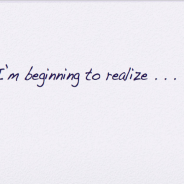Is the Struggle to Make Meaning Good for Your Health? (part 2)
Here’s a second study relevant to struggling, this one conducted by psychologist Eugene Gendlin in the early sixties, and discussed in the first chapter of Ann Weiser Cornell’s book, The Power of Focusing. Apparently, Gendlin, then at the University of Chicago, was interested in the question: “Why is psychotherapy helpful for some people and not others?” What he did, first, was to tape hundreds of therapy sessions, gathered from many different therapists and clients. Then he asked therapists and clients to rate whether the psychotherapy had been successful. If both agreed, and if psychological testing supported this finding, the therapy was deemed successful. This successful therapy was then compared to therapy that was considered by the participants to be a failure. When researchers listened to the tapes of successful therapy vs. unsuccessful therapy they noted one key difference. Clients in successful therapy struggled more. Ann Weiser Cornell writes: . . . at some point in the session, the successful therapy clients would slow down their talk, become less articulate, and begin to grope for words to describe something that they were feeling at the moment. If you listened to the tapes, you would hear something like this: ‘Hmmmm. How would I describe this? It’s right here. It’s . . . uh . . . it’s . . . it’s not exactly anger . . . hmmmm.’ Often the clients would mention that they experienced this feeling in their bodies, saying things like, ‘It’s right here in my chest,’ or ‘I have this funny feeling in my stomach.’ In contrast, clients who felt like the therapy was a failure didn’t struggle in this way. They were actually more articulate—or more apparently articulate—in the sense that they spoke in smooth, less interrupted ways. (They were, it would seem, more glib. They had things figured out–but nothing changed.) I find this comparison fascinating, and not inconsistent with what I often see with patients. This week, for instance, it often seemed like we were all struggling to make meaning–patients as well as myself. And I love how this study offers a rationale for not only tolerating such struggle for meaning but in fact encouraging it and perhaps celebrating it. I find myself wondering about this question: Why is writing more healing for some people than it is for others? Could it have something to do with how much a person is willing to struggle on the page? A kind of willingness, perhaps, to be initially inarticulate—and halting—and groping—in the service of eventually coming to a new understanding—perhaps a new story—or a new form for one’s story. The Power of Focusing can be found here....
read more

